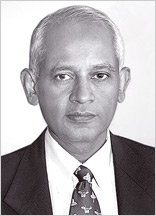‘ICT can help build meaningful relationships’
The role of ICT in reconciliation is a significant part of the global
dialogue on reconciliation and it is a main aspect of bringing about
reconciliation in a nation torn by decades of conflict. “ICTs can help
build meaningful relationships between people who are geographically and
culturally diverse as well as those who have been severed by mistrust
and enmity; the more ICT applications on the ground, the better”,
Secretary to the President Lalith Weeratunga said.
The Secretary to the President was delivering the keynote address at
fifth National Conference on Reconciliation, the “National Conference on
the Role of Information Communication Technology (ICT) in
Reconciliation” hosted by the Lakshman Kadirgamar Institute for
International Relations and Strategic Studies (LKIIRSS) recently.
|

Presidential Secy Lalith
Weeratunga |
The conference consisted of question and answer sessions between the
speakers and members of the audience and concluded with a networking
session.
President's Secretary Weeratunga said that ICT remains an instrument
in facilitating reconciliation: “Technology has no stand alone power; it
is simply a tool,” he said. He identified seven uses of ICT in the
national reconciliation process.
He said Sri Lanka must ensure the sharing of knowledge and
information. “Let us consider knowledge and information systems for
reconciliation, as conflict arises in an environment of knowledge
deficiencies and misinformation.” He said post-conflict Rwanda shows the
effective application of ICTs in managing knowledge.
Secy Weeratunga added that, “Access to reliable information and
knowledge is the responsibility of a democracy. The government must
always do the right thing at any given time, unlike a terrorist
organization.” He said that a government must always be transparent and
ICT helps in creating transparency and increasing accountability. He
said that ICT helps government to streamline its services and provide a
high quality service for citizens. Free from the hassles encountered by
people at the immigration department for example, “my dream is to enable
Sri Lankans to obtain a passport from home!” Weeratunga said.
ICTs contribute to the social and economic development of a nation to
a great extent. For example, the Northern and Eastern Provinces are
highly integrated into national development programmes, Secretary
Weeratunga said. “President Mahinda Rajapaksa has connected all
government ministries and departments and ministries that needed to be
connected, and now the North and the East are also connected to the
government network and the whole country is brought together”,
Weeratunga said. He said that government services are available to all
people in Sri Lanka as a result of the application of ICT – which
contributes in achieving one LLRC recommendation – through the
government portal www.srilanka.lk and dialing 1919, where people can
call to make inquiries or complaints using Sinhala, Tamil, or English.
Secy Weeratunga said that he was happy that today 15 percent of the
calls which come in through 1919 are from Tamil speakers. “All services
are available in all three languages and are executed equally
efficiently”, Weeratunga said. “I want to keep people out of government
offices as far as possible!” President's Secretary Weeratunga said.
However, there exists obstacles in the use of ICTs in reconciliation
and knowledge-sharing, Weeratunga stated. He identified following three
obstacles in ICT use in Sri Lanka:
The digital divide as all do not have/ use computers (although almost
everyone uses a mobile phone)
The need for interoperability (incompatibility of data formats), as
organizations often become attached to their own formats and are
unwilling to change in order to share with others. Although ensuring
interoperability is not an easy process, data always needs to be in a
common format so that it can be shared between organizations. For
example, the data should be compatible between the five mobile operators
in Sri Lanka. Security of emails and content on the web: when
considering whether to share sensitive information on the web,
individuals and organizations need to have confidence that the
information will not be shared with any unauthorized bodies; governments
have to be particularly sensitive to this task, especially as inaccurate
or misleading information can have serious consequences during a
conflict and creates an unnecessary risk to their own credibility or
security.
Secy Weeratunga said, “In policy terms, information sharing is often
not considered a priority; this is a day-to-day issue that we have, and
also a fairly top-level policy issue. Systems have not been put in place
to ensure that government staff has guidelines to help them decide when
and how to share information.”
He recalled how ICTA has had a trying time convincing certain
government departments to allow their (application) forms to be
downloadable from their websites. “‘How can you allow someone to
download a form from nowhere and bring it in to our office?. Weeratunga
said that most of the government forms are available online at
www.gic.gov.lk.
“Whatever tools we employ, needs to be done with care, with
understanding, and considering the consequences they can have; by
enhancing the positive side of ICTs while controlling the bad side.”
Weeratunga also added that work in reconciliation should be undertaken
in a transparent and open manner in a framework of trust between
different stakeholders for progress and peace. “I want to live in a Sri
Lanka that is safe, sound, credible, and peaceful,” Weeratunga said.
Among the other speakers were, CEO, ICT Agency of Sri Lanka Reshan
Dewapura, Executive Vice President, John Keells Holdings PLC Ramesh
Shanmuganathan, CEO, 99x Technology Mano Sekaram, Consultant to the DG,
Telecommunication Regulatory Commission of Sri Lanka Dr. Manodha Gamage,
Managing Director, Hayleys BPO and Shared Services Dr. Arul
Sivagananathan, Professor, Department of Computer Science, University of
Jaffna Dr. Charles Eugene and Director of IT, Parliament of Sri Lanka
Mahesh PereraExecutive Director of the Kadirgamar Institute Asanga
Abeyagoonasekera. The Kadirgamar Institute Blog and Twitter account were
launched to open interaction between the Kadirgamar Institute, the
research community, and the public. |





